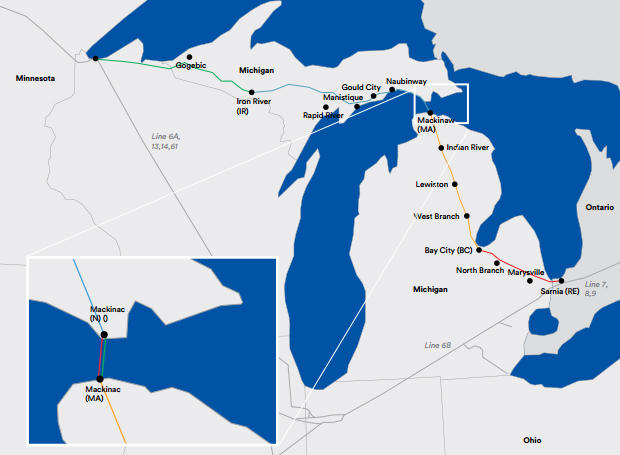By LOGAN CLARK
Capital News Service
LANSING – Enbridge Inc. can now defend its interests in a Sierra Club lawsuit claiming the U.S. Forest Service failed to adequately review a permit for the company’s oil pipeline stretching below the Straits of Mackinac.
A federal judge has allowed Enbridge to intervene in the lawsuit over the pipeline known as Line 5. It runs from northern Wisconsin through the Upper Peninsula, south across the Straits of Mackinac separating the UP and Lower Peninsula, and then into Canada at Sarnia..

Line 5 pipeline route through Michigan. Credit: Enbridge Inc.
It’s part of Enbridge’s Lakehead System that brings petroleum from northwestern Canada to southern Ontario through the Great Lakes states.
The pipeline also runs under the Huron-Manistee National Forest in the northern Lower Peninsula. That’s why the Sierra Club said it sued, claiming the Forest Service violated federal law by issuing a special permit to the company.
The permit reissued last December allows Line 5 to continue operating under the national forest without considering its environmental effects, according to the suit.
The suit filed in U.S. District Court in Bay City contends that the pipeline has never undergone federal environmental analysis since it was constructed in 1953.
U.S. District Judge Thomas Ludington granted Enbridge’s request to actively take part in the case because the eventual decision will affect the company.
Graham White, Enbridge’s manager of business communications and public affairs, declined to comment on the case. Jason Manshum, Enbridge specialist for U.S. public affairs liquids operations and projects, referred to the company’s February statement saying that under federal law, the special permit renewal doesn’t require the kind of review Sierra Club is demanding.
According to Marvin Roberson, a forest ecologist for the Sierra Club, the company feels its specific interests may not be adequately represented in court by the Forest Service, and a court decision could jeopardize the existence of Line 5 entirely.
The Sierra Club decided not to challenge the intervention and expected the judge to grant it, Roberson said. “Even though we are not challenging it, they still found it necessary to make a 25-page write-up defending the intervention.”
After a small leak from the 60-year-old pipeline north of Manistique in the U.P. early last December, the Sierra Club expressed concerns that the line threatens the environment. The group said that especially at risk are areas near the Au Sable River and under the Straits of Mackinac.
Enbridge should never have received the special permit in the first place, said Anne Woiwode, conservation director of the Sierra Club’s Michigan chapter.
“The National Environmental Policy Act was enacted in 1970, and despite that, the Forest Service had considered this pipeline to be ‘categorically excluded’ from environmental review based, in effect, on the pipeline having been in place for so long,” Woiwode said.
The Sierra Club argues that the Forest Service was wrong in exempting Line 5 from an environmental impact statement. Federal agencies may grant exemptions in certain circumstances, as was done for the pipeline.
The lawsuit claims that Enbridge’s exemption isn’t justified, even though the law went into effect almost two decades after the pipeline was built.
“It is indefensible for the federal government to say that no environmental analysis is needed for a pipeline carrying a half-million barrels of oil a day across the Great Lakes, through a national forest and under numerous sensitive areas,” Woiwode said.
The Forest Service disagrees, stating in its permit’s decision memo “that there are no extraordinary circumstances which may result in significant individual or cumulative effects on the quality of the environment. This project is consistent with the Forests’ approved land and Resource Management Plan.”
Woiwode said the Sierra Club considers litigation “only as a last resort.”
Enbridge also owns a pipeline that leaked almost a million gallons of oil into the Kalamazoo River watershed in 2010. It is the record for the largest and most costly inland oil spill in U.S. history. The cleanup is still underway.
Logan Clark writes for Great Lakes Echo.